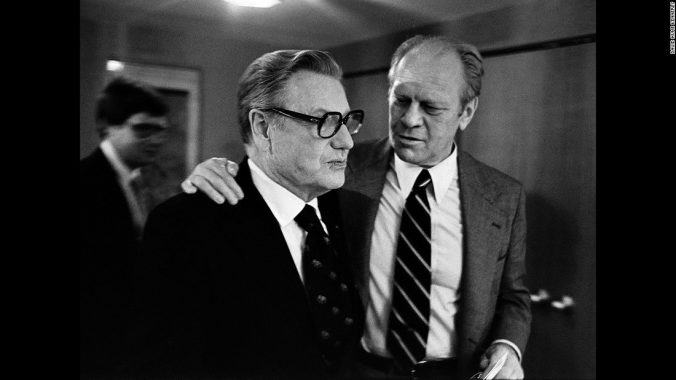Penthouse, 1975
When Gerald Ford chose Nelson Rockefeller to be his vice president, he was quick to point out that his nominee would come in handy. Rockefeller, Ford assured the evening news, was a man of many talents. The president told no lies. Nelson Rockefeller comes in handy just about anywhere he’s used.
Less than a month after his confirmation the new vice president found a ready outlet for his skills. The Central Intelligence Agency was accused of spying stateside, and Rockefeller was called upon to head the Blue Ribbon Commission to Investigate the CIA. Ford was sure that Rockefeller was just the man to sort the charges out. A few folks have cried foul, pointing to the former New York governor’s five-year stint on the committee that oversees the agency he is now to investigate. But Rockefeller views his appointment differently. His prior job was, he explained, all part of his “working knowledge of intelligence,” and a central resource for a man conducting investigations such as the Blue Ribbon Commission. That kind of working knowledge shouldn’t be squandered.
If it weren’t for his family’s business, Nelson Rockefeller might not know nearly as much about intelligence as he does. The Rockefellers’ business is money-its management and its accumulation. In three generations the family has bought control of 250 billion-dollars worth of corporations. It has also cornered one-half of the total of American private investments in Asia, Africa, and Latin America. Inevitably, the CIA and the family business crossed paths early in the agency’s career.
Allen Dulles was appointed director of the CIA in 1953-he came to government service straight from a job as a Rockefeller lawyer. That same year, the CIA, worried that the existing Iranian government might nationalize foreign investments, engineered a coup and replaced the premier with a former Nazi. Shortly thereafter, Standard Oil, the foundation of the Rockefellers’ family business, began to tap Iranian oil reserves. In 1961, the same script was acted out in the Congo-Patrice Lumumba, that country’s premier, was murdered by his own army and replaced by a soldier named Mobutu. In the aftermath of the Congolese revolution, David Rockefeller, chairman of Chase Manhattan Bank and Nelson’s brother, led an expedition of businessmen into Mobutu-land to explore the “investment climate.” It must have been good. Using Rockefeller financing, Pan Am acquired the local airline, AT&T built a subsidiary, Esso drilled for oil, and Standard of Indiana went into the copper business.
The next CIA director, John McCone, took over the reins of intelligence after working as a Standard Oil attorney. Following McCone’s appointment the familiar pattern of CIA intervention in foreign governments recurred. Salvador Allende, the first Communist president in Chile’s history, was overthrown by a CIA-financed coup in 1973. The year before, Allende had expropriated the Anaconda copper mines, an important wing of the Rockefellers’ family business. Henry Kissinger-chairman of the security council that approved, and may even have ordered, CIA intervention in Chile -is a longtime Rockefeller family employee. With a background like that, Nelson Rockefeller is establishing a whole new level of expertise in government service. He is also insuring himself of a lot of work in the future. It will be nearly impossible to convene any more commissions without calling on Nelson Rockefeller’s mass of ”working knowledge.”
The commission on high interest rates will certainly need the counsel of a man whose family controls 20 percent of the banks in the United States. It would be foolish to pass over his experience. And the commission on gas prices is a natural, too. The Rockefeller family has controlling interests in Standard, Mobil, Amoco, Arco, Esso, American, Citgo, Exxon, and Humble oil companies.
If Gerald Ford decides to take on the insurance companies, we can all rest easy knowing he has expert help. The Rockefellers have their hands on one-quarter of all the life Insurance sold in this country.
After that we can look forward to the Blue Ribbon Commission on Consumer Prices. With Nelson Rockefeller in the administration, Gerald Ford has the inside track here as well. The vice president is one of the owners of Mazola Corn Oil, Karo Syrup, Kleenex, Nuco Margarine, Kotex Sanitary Napkins, Skippy Peanut Butter, Best Food Mayonnaise, Orange Crush, and the American Sugar Company.
It’s hard to imagine that the commission on corporate taxation would get far without the man whose company, Standard Oil of Ohio, earned $66 million last year and paid no taxes. Or that the commission on the distribution of wealth would be complete without the leadership of a man whose family’s personal fortune is larger than the total worth of 100 million Americans. And just think how useful the vice president could be to the commission on urban renewal and safer neighborhoods. The Rockefeller Pocantico Hills estate, which is staffed by five hundred servants and protected by thirty-five armed guards, covers five square miles and is surrounded by electric barbed wire. Living like that must have taught Nelson Rockefeller a lot. It’s a shame not to put his knowledge to good use.
Gerald Ford made a shrewd appointment: whatever the subject, Nelson Rockefeller knows it like he owns it.

Leave a Reply